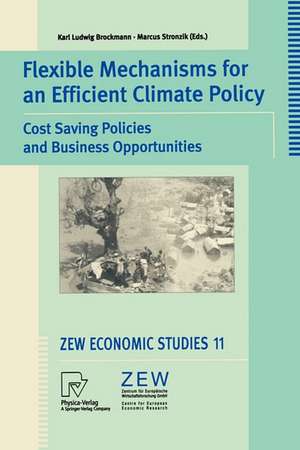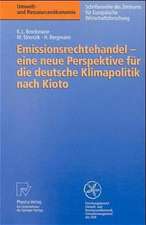Flexible Mechanisms for an Efficient Climate Policy: Cost Saving Policies and Business Opportunities: ZEW Economic Studies, cartea 11
Editat de Karl L. Brockmann, Marcus Stronziken Limba Engleză Paperback – 31 iul 2000
Din seria ZEW Economic Studies
-
 Preț: 394.87 lei
Preț: 394.87 lei - 15%
 Preț: 644.18 lei
Preț: 644.18 lei -
 Preț: 387.75 lei
Preț: 387.75 lei - 15%
 Preț: 638.57 lei
Preț: 638.57 lei -
 Preț: 389.88 lei
Preț: 389.88 lei -
 Preț: 379.48 lei
Preț: 379.48 lei -
 Preț: 381.43 lei
Preț: 381.43 lei -
 Preț: 381.81 lei
Preț: 381.81 lei -
 Preț: 382.57 lei
Preț: 382.57 lei -
 Preț: 387.96 lei
Preț: 387.96 lei -
 Preț: 379.86 lei
Preț: 379.86 lei - 15%
 Preț: 643.34 lei
Preț: 643.34 lei -
 Preț: 390.25 lei
Preț: 390.25 lei - 15%
 Preț: 640.55 lei
Preț: 640.55 lei -
 Preț: 382.18 lei
Preț: 382.18 lei - 15%
 Preț: 632.70 lei
Preț: 632.70 lei -
 Preț: 385.84 lei
Preț: 385.84 lei - 15%
 Preț: 645.28 lei
Preț: 645.28 lei - 15%
 Preț: 640.88 lei
Preț: 640.88 lei -
 Preț: 386.61 lei
Preț: 386.61 lei -
 Preț: 380.07 lei
Preț: 380.07 lei - 15%
 Preț: 644.63 lei
Preț: 644.63 lei -
 Preț: 389.70 lei
Preț: 389.70 lei - 18%
 Preț: 945.79 lei
Preț: 945.79 lei - 15%
 Preț: 640.88 lei
Preț: 640.88 lei -
 Preț: 383.33 lei
Preț: 383.33 lei - 15%
 Preț: 638.11 lei
Preț: 638.11 lei - 15%
 Preț: 639.25 lei
Preț: 639.25 lei -
 Preț: 385.62 lei
Preț: 385.62 lei -
 Preț: 384.86 lei
Preț: 384.86 lei - 15%
 Preț: 638.57 lei
Preț: 638.57 lei - 15%
 Preț: 633.68 lei
Preț: 633.68 lei -
 Preț: 384.86 lei
Preț: 384.86 lei - 15%
 Preț: 635.15 lei
Preț: 635.15 lei - 15%
 Preț: 653.98 lei
Preț: 653.98 lei - 15%
 Preț: 636.30 lei
Preț: 636.30 lei -
 Preț: 382.18 lei
Preț: 382.18 lei - 15%
 Preț: 639.41 lei
Preț: 639.41 lei -
 Preț: 382.57 lei
Preț: 382.57 lei - 15%
 Preț: 639.59 lei
Preț: 639.59 lei -
 Preț: 389.49 lei
Preț: 389.49 lei - 15%
 Preț: 646.30 lei
Preț: 646.30 lei - 15%
 Preț: 638.43 lei
Preț: 638.43 lei - 15%
 Preț: 639.08 lei
Preț: 639.08 lei -
 Preț: 383.71 lei
Preț: 383.71 lei -
 Preț: 382.75 lei
Preț: 382.75 lei
Preț: 379.30 lei
Nou
Puncte Express: 569
Preț estimativ în valută:
72.59€ • 75.50$ • 59.93£
72.59€ • 75.50$ • 59.93£
Carte tipărită la comandă
Livrare economică 14-28 aprilie
Preluare comenzi: 021 569.72.76
Specificații
ISBN-13: 9783790813142
ISBN-10: 3790813141
Pagini: 140
Ilustrații: VIII, 130 p. 16 illus.
Dimensiuni: 155 x 235 x 7 mm
Greutate: 0.21 kg
Ediția:Softcover reprint of the original 1st ed. 2000
Editura: Physica-Verlag HD
Colecția Physica
Seria ZEW Economic Studies
Locul publicării:Heidelberg, Germany
ISBN-10: 3790813141
Pagini: 140
Ilustrații: VIII, 130 p. 16 illus.
Dimensiuni: 155 x 235 x 7 mm
Greutate: 0.21 kg
Ediția:Softcover reprint of the original 1st ed. 2000
Editura: Physica-Verlag HD
Colecția Physica
Seria ZEW Economic Studies
Locul publicării:Heidelberg, Germany
Public țintă
ResearchCuprins
Anthropogenic Climate Change: The Risk of Unpleasant Surprises.- Possibilities and Limitations for Flexible Compliance with the Kyoto Targets.- Shaping Greenhouse Gas Abatement Strategies — Policy Issues and Quantitative Insights.- Design of the Flexibility Mechanisms: An NGO’s Perspective.- Project-Based Instruments: Economic Consequences of the Kyoto and Buenos Aires Framework and Options for Future Development.- Key Developments Related to Greenhouse Gas Trading and Key Issues to Be Resolved.- US Experience in SO2 and NOX, Emissions Trading and Developments in the Greenhouse Gas Market.- Political and Economic Scope for Permit Markets in Europe.- Negotiated Agreements and ‘Flexible Mechanisms’: Building Blocks for Efficient Kyoto Implementation Strategies in the European Union?.- Greenhouse Gas Emissions Trading in a Private Company — BP Amoco’s Flexible Mechanisms for an Efficient Climate Policy.- Meeting the Climate Challenge in the Near Term: Policy Incentives for Early Action.- A Proposal for Credible Early Action in US Climate Policy.
Textul de pe ultima copertă
In the Kyoto Protocol to the UN Framework Convention on Climate Change, industrialized countries agreed on binding absolute targets for greenhouse gas emissions and on the admission of flexible market-economy instruments - such as emissions trading, joint implementation and the clean development mechanism - used for reaching the targets. The contributions in this volume reveal that flexible instruments can lower the costs of climate protection considerably - not only in theory, but also in practice. Concerning implementation, it will be necessary to take care of possible loopholes, uncertainties and transaction costs which may be too high if no proper design is chosen.












